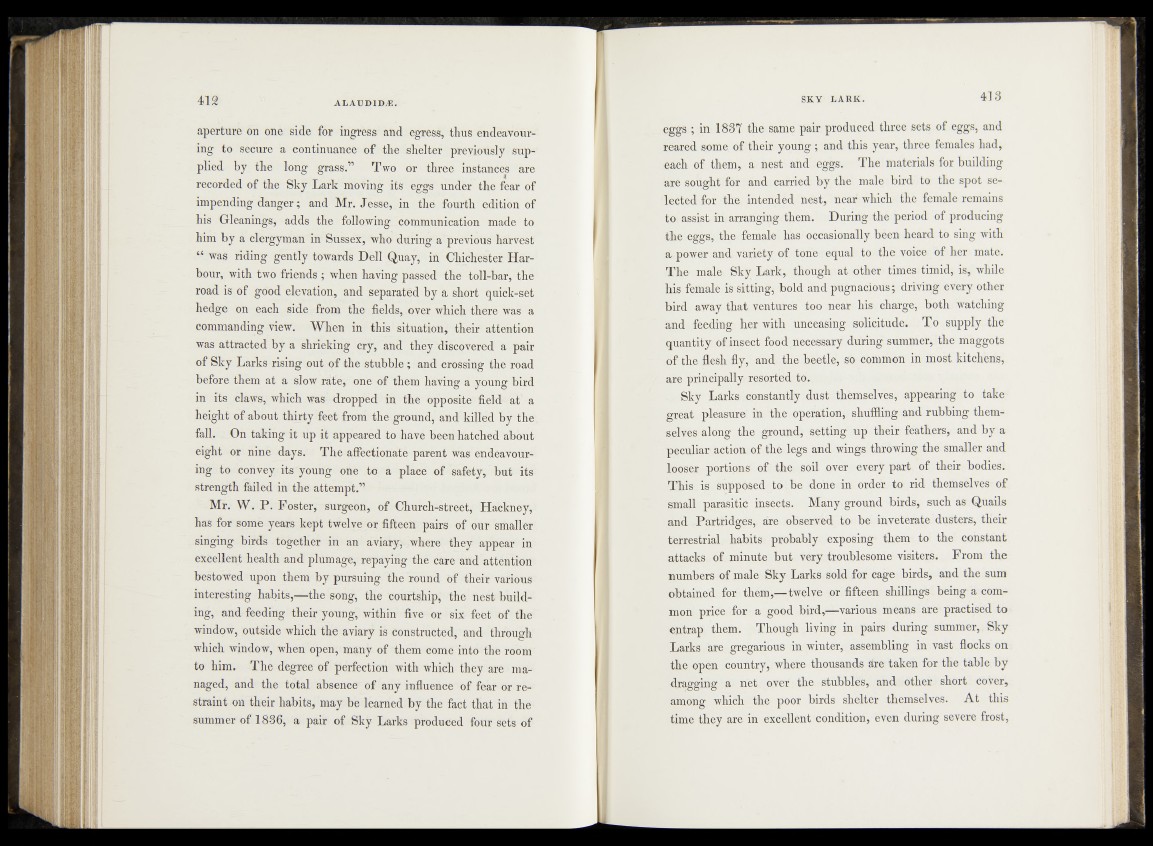
aperture on one side for ingress and egress, thus endeavouring
to secure a continuance of the shelter previously supplied
by the long grass.” Two or three instances are
recorded of the Sky Lark moving its eggs under the fear of
impending danger; and Mr. Jesse, in the fourth edition of
his Gleanings, adds the following communication made to
him by a clergyman in Sussex, who during a previous harvest
“ was riding gently towards Dell Quay, in Chichester Harbour,
with two friends ; when having passed the toll-bar, the
road is of good elevation, and separated by a short quick-set
hedge on each side from the fields, over which there was a
commanding view. When in this situation, their attention
was attracted by a shrieking cry, and they discovered a pair
of Sky Larks rising out of the stubble ; and crossing the road
before them at a slow rate, one of them having a young bird
in its claws, which was dropped in the opposite field at a
height of about thirty feet from the ground, and killed by the
fall. On taking it up it appeared to have been hatched about
eight or nine days. The affectionate parent was endeavouring
to convey its young one to a place of safety, but its
strength failed in the attempt.”
Mr. W. P. Foster, surgeon, of Church-street, Hackney,
has for some years kept twelve or fifteen pairs of our smaller
singing birds together in an aviary, where they appear in
excellent health and plumage, repaying the care and attention
bestowed upon them by pursuing the round of their various
interesting habits,—the song, the courtship, the nest building,
and feeding their young, within five or six feet of the
window, outside which the aviary is constructed, and through
which window, when open, many of them come into the room
to him. The degree of perfection with which they are managed,
and the total absence of any influence of fear or restraint
on their habits, may be learned by the fact that in the
summer of 18-36, a pair of Sky Larks produced four sets of
eggs ; in 1837 the same pair produced three sets of eggs, and
reared some of their young; and this year, three females had,
each of them, a nest and eggs. The materials for building
are sought for and carried by the male bird to the spot selected
for the intended nest, near which the female remains
to assist in arranging them. During the period of producing
the eggs, the female has occasionally been heard to sing with
a power and variety of tone equal to the voice of her mate.
The male Sky Lark, though at other times timid, is, while
his female is sitting, bold and pugnacious; driving every other
bird away that ventures too near his charge, both watching
and feeding her with unceasing solicitude. To supply the
quantity of insect food necessary during summer, the maggots
of the flesh fly, and the beetle, so common in most kitchens,
are principally resorted to..
Sky Larks constantly dust themselves, appearing to take
great pleasure in the operation, shuffling and rubbing themselves
along the ground, setting up their feathers, and by a
peculiar action of the legs and wings throwing the smaller and
looser portions of the soil over every part of their bodies.
This is supposed to be done in order to rid themselves of
small parasitic insects. Many ground birds, such as Quails
and Partridges, are observed to be inveterate dusters, their
terrestrial habits probably exposing them to the constant
attacks of minute but very troublesome visiters. From the
numbers of male Sky Larks sold for cage birds, and the sum
obtained for them,—twelve or fifteen shillings being a common
price for a good bird,—various means are practised to
entrap them. Though living in pairs during summer, Sky
Larks are gregarious in winter, assembling in vast flocks on
the open country, where thousands dre taken for the table by
dratra'ina' a net over the stubbles,oo o and other short cover,
among which the poor birds shelter themselves. At this
time they are in excellent condition, even during severe frost,